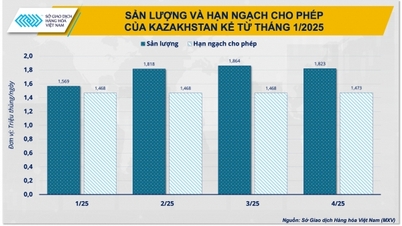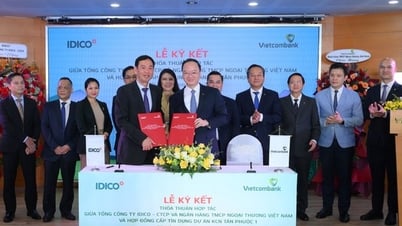 |
On November 20, 2024, the Prime Minister issued the National Action Plan on Digital Economic Development for the 2024-2025 period. Earlier this year, the Prime Minister also issued Decision No. 232/QD-TTg dated January 24, 2025 approving the Project on Establishing and Developing a Carbon Market in Vietnam... This demonstrates the Government's determination to gradually shape the ecosystem for emerging asset classes such as digital assets and carbon credits.
Digital assets and carbon credits are increasingly widely accepted, especially in the context of the Ministry of Finance building a legal framework for digital assets. According to the plan, by 2028, a pilot carbon credit trading floor will also be established.
The question is, will banks accept these new assets as collateral for loans?
Speaking at the workshop “Banking collateral - Current concerns” organized by Banking Times on the morning of May 28 in Hanoi, Mr. Giacomo Merello, Chairman of the Antigua & Barbuda Digital Asset Business Promotion Council; Special Economic Envoy of the Prime Minister of Antigua & Barbuda in Singapore said that in the world , some countries have allowed the use of digital assets in general, cryptocurrencies in particular, as collateral at banks.
Typically, cryptocurrencies used as collateral at banks are stablecoin (a cryptocurrency created to track the value of another asset or currency, usually in US dollars or Euros, such as USDT, USDC...) or some large-value cryptocurrencies such as bitcoin, ethereum. For example, Switzerland allows banks to provide loans guaranteed in cryptocurrencies, but this service is mainly provided to investment funds, large businesses, not applicable to small individuals.
In Vietnam, according to Dr. Le Thi Giang, Hanoi Law University, the legal framework for digital assets is still under construction. Notably, the Draft Law on Digital Technology Industry has initially established the concept of digital assets and ownership of these assets. “This is an important step that paves the way for the establishment and secured transactions of digital assets in the future,” Ms. Giang emphasized.
As for carbon credits, this is a type of asset associated with the green transition trend and is receiving increasing attention in the financial sector. However, the establishment of secured transactions for carbon credits is still not specifically regulated in Vietnamese law.
Therefore, this expert believes that if digital assets and carbon credits are considered as bank collateral, banks will be hesitant because any transaction must be based on a clearly defined legal basis. Currently, there is no legal provision indicating that, in addition to conventional, traditional collateral, carbon credits and digital assets can be considered collateral.
Although there is no complete legal framework, some current regulations have begun to guide this. At point 8, Decree No. 21/2021/ND-CP of the Government guiding the Civil Code on securing the performance of obligations stipulates that secured assets include existing assets and assets formed in the future, except for assets that are prohibited from being bought and sold, prohibited from being transferred, or prohibited from being transferred. Therefore, it can be affirmed that the Law has very broad provisions on secured assets.
If compared with this regulation, it can be seen that the Law on Environmental Protection 2020 directly mentions carbon credits. Currently, in Vietnam, carbon credit trading activities are becoming more and more popular and are not prohibited from buying, selling, or transferring.
Therefore, it can be understood that accepting carbon credits as collateral is completely feasible. However, the actual implementation is an extremely difficult problem for banks. With traditional assets such as land and housing, banks have a lot of experience in the business, while carbon credits are still a very new type of asset, so accepting carbon as collateral will be a big challenge for pioneering banks in this field.
Dr. Lawyer Vu Van Tinh suggested that Vietnam should study and issue a separate law or decree on digital assets, clearly defining the responsibilities of related parties such as issuers, exchanges, investors and requiring operating licenses. On the other hand, strengthen supervision against money laundering and terrorist financing, requiring exchanges to register with the management agency.
In addition, it is necessary to publicize information on risks, transaction fees, and energy consumption of digital asset projects to protect consumers and the environment; Develop a legal mechanism for smart contracts, ensuring legal binding when used in digital asset mortgages; Allow digital asset mortgages in real estate transactions, reduce barriers for foreign investors and optimize taxes, etc.
In the immediate future, it is possible to issue a sandbox testing regulation allowing some banks or financial institutions to pilot digital asset mortgage loans for 3-5 years; Evaluate the pilot results to adjust the legal framework, ensuring a balance between innovation and risk control; Prioritize highly liquid digital assets during the testing phase; consider establishing a specialized agency to monitor the digital asset market, ensuring compliance with regulations on capital, risk management, and anti-money laundering. One of the contents is to implement a program to educate people about the risks of digital assets and how to safely use digital mortgage platforms; build a warning system and provide legal support for investors facing risks in digital asset transactions.
Source: https://baodautu.vn/mang-bitcoin-ethereum-tin-chi-carbon-the-chap-ngan-hang-de-vay-von-d274457.html






![[Photo] Prime Minister Pham Minh Chinh meets with Hungarian President Sulyok Tamas](https://vphoto.vietnam.vn/thumb/1200x675/vietnam/resource/IMAGE/2025/5/29/dbcaa73e92ea4448a03fe1d0de6d68e8)
![[Photo] Vietnamese and Hungarian leaders attend the opening of the exhibition by photographer Bozoky Dezso](https://vphoto.vietnam.vn/thumb/1200x675/vietnam/resource/IMAGE/2025/5/29/94d8ceca5db14af3bf31285551ae4bb3)





















![[Photo] Prime Minister Pham Minh Chinh receives a bipartisan delegation of US House of Representatives](https://vphoto.vietnam.vn/thumb/1200x675/vietnam/resource/IMAGE/2025/5/28/468e61546b664d3f98dc75f6a3c2c880)




























































Comment (0)